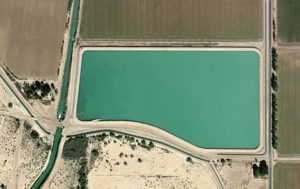Aerial view of IID’s Sheldon Reservoir, the largest in the Imperial Valley. IID’s new Upstream Operational Reservoir Project, near the All-American and East Highline Canals, will be more than four times larger
The Imperial Irrigation District has been awarded $7 million in grant funds from the Department of the Interior in support of the district’s proposed Upstream Operational Reservoir Project, which would be the largest reservoir ever constructed in the Imperial Valley during IID’s 113-year history as an irrigation district.
The announcement was recently made by the Interior Department, with funds coming from the Bipartisan Infrastructure Law to increase water supply reliability. This latest grant award to IID is in addition to a $9.5 million grant previously awarded to the district for a total of $16.5 million in federal funding for the Upstream Operational Reservoir Project.
“We all have been working very hard for a long time to maximize water management efficiency in the Imperial Valley and this will help us do that on a large scale,” said IID Board President Alex Cardenas, who congratulated the district’s Water Department for their grant writing skill and cooperation with federal officials. “These funds will help us get one step closer to getting this very important project completed,” he added.
IID Director Karin Eugenio, whose Division 5 includes eastern Imperial County, saluted the federal government’s continued cooperation with IID, offering a “shoutout” to U.S. Bureau of Reclamation Commissioner Camille Touton for her support and unwavering commitment to recognize the importance of these projects.
“We very much appreciate the ongoing collaboration with our federal partners, particularly Commissioner Touton,” said Director Eugenio. “She continues to work with IID and its water users to make important projects like this reservoir happen.”
The district has been working on the Upstream Operational Reservoir Project for about eight years, and a number of tasks remain to be completed, including design, engineering, site and inlet structure locations, etc. “As part of the process, staff is working on the environmental process,” said IID General Manager Jamie Asbury, “and we appreciate the community’s help and engagement to help see this project through.”
The new reservoir would have a 2,100 acre-feet capacity, which is twice as large as the district’s off-line storage system and four times larger than the biggest in-Valley reservoir with a goal of accommodating short water orders downstream in the eastern Imperial Valley, managing up to 365,000-acre feet of water annually and conserving up to 15,000 acre-feet of water per year.
With the intent to maximize the district’s water management efficiency, plans are for the new reservoir, which would be IID’s 12th, to be located upstream in the southeastern region of the Imperial Valley near the All-American and East Highline Canals. It’s proposed basin area would cover up to 440 acres.
IID constructed its latest reservoir in 2023 – the Lloyd Allen Water Conservation Operational Reservoir, located east of Calipatria, which works to conserve up to 400 acre-feet per year as part of the district’s system conservation program.
About IID’s Operational Reservoirs:
IID operates 11 main canal scheduling areas supported by 11 raw water, operational storage reservoirs with a combined capacity of 4,623 acre-feet. The main canal reservoirs vary in size from 200 acre-feet to 1,251 acre-feet in capacity. The Lloyd Allen Reservoir was the first of a series of smaller mid-lateral reservoirs prioritized to be constructed by IID and has an approximate 42 acre-feet capacity.
IID’s existing operational reservoirs manage and regulate approximately 15 to 25 percent of IID’s total annual flow. The reservoirs allow increased delivery flexibility, and improved system efficiency and provide for conservation opportunities within the IID water service area. Efficient and timely operational coordination together with the use of IID’s various regulating reservoirs allow IID to provide delivery flexibility to farmers and minimize operational discharge even though Colorado River diversions at Imperial Dam remain fixed for 24-hour periods.






